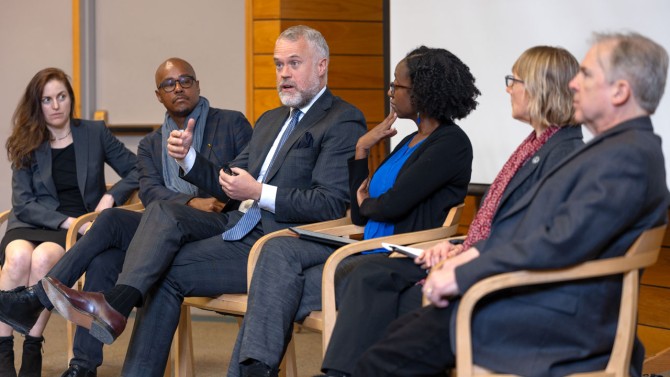
New York State Assemblyperson Anna Kelles (D-125th District) addresses an Emerson Hall audience on Feb. 28 during “What’s Next for STEM Research,” an expert panel organized by the graduate student-led Cornell Advancing Science and Policy Club.
Panels discuss federal research funding threats, opportunities
By James Dean, Cornell Chronicle
Lead with values, innovate, engage with your community, contact elected officials, write to local newspapers – and work to build more resilient systems.
Those were some of the strategies legal and policy experts shared on Feb. 28 during a pair of public panels organized by faculty and students to discuss the state of science research amid proposed severe cuts to federal grants and layoffs of federal employees, including research scientists.
“The research we do improves our health, it drives our economy, it keeps our nation safe,” said Chris Schaffer, professor in the Meinig School of Biomedical Engineering in Cornell Engineering. “This is a critical thing in our country. It’s easy to make this sales pitch, but we need to go out and do it.”
Schaffer, whose lab studies neurodegenerative diseases including Alzheimer’s, and who once served as a science policy adviser to U.S. Sen. Ed Markey (D-Massachusetts, was part of “What’s Next for STEM Research,” organized by the graduate student-led Cornell Advancing Science and Policy (ASAP) Club. Participants in the Emerson Hall and livestreamed event included New York State Assemblyperson Anna Kelles (D-125th District).
Earlier, in Goldwin Smith Hall, the Department of Science and Technology Studies hosted “Science Under Siege? Politics, Policy and Practice After 2024,” moderated by Suman Seth, the Stephen H. Weiss Presidential Fellow and Marie Underhill Noll Professor of the History of Science and chair of science and technology studies, in the College of Arts and Sciences (A&S).
The panels convened more than two weeks after Cornell announced it had joined 11 other universities as a plaintiff in a lawsuit filed by the Association of American Universities, Association of Public and Land-grant Universities and American Council on Education, challenging cuts to indirect costs associated with National Institutes of Health grants.
Separately, mid-February firings of scientists at the U.S. Department of Agriculture’s Agricultural Research Service abruptly left some graduate students without advisers and access to their labs, at least temporarily (some of the scientists have been reinstated).
“As agricultural researchers, we work to answer questions that are asked by farmers,” said Isako Di Tomassi, an ASAP board member and second-year doctoral student in the field of plant pathology and plant-microbe biology whose lab was investigating potato blight. “We are all about supporting agricultural production and food security.”
Jamila Michener, associate professor of government (A&S) and of public policy in the Cornell Jeb E. Brooks School of Public Policy, who studies racism and inequality, said during “Science Under Siege?” that attacks on such scholarship are nothing new. Universities historically have enabled research regardless of popularity or pushback, she said, but the current moment forces a hard look at their strengths and weaknesses.
“That can either cause us to pull back, or it can help us to re-evaluate: How do we build resilience into institutions like universities?” said Michener, senior associate dean of public engagement in the Brooks School and director of the Cornell Center for Racial Justice and Equitable Futures. “It doesn’t quite matter whether you study plants, or amoeba, or Black people, the threat is against the university as an institution, the threat is against science as an enterprise, and that involves all of us.”
Peter Loewen, the Harold Tanner Dean of A&S and professor of government, said that while universities would prefer not to be facing strong external pressure, the current crisis shouldn’t be wasted.
“If we’re looking for a bright spot, it may well be to give us a chance to pause and think about how do we do things differently,” Loewen said. “If we’re in this environment for a long time, (we can) try to find a little bit of innovation in that.”
Several panelists emphasized the need for scientists to communicate their work – and all its uncertainties – more effectively to the public. Schaffer referenced Pew Research Center surveys showing a strong majority of the public now regards scientists as “odd and aloof.”
“They’ve heard our data, our directives, us telling them about our latest discovery and how important it’s going to be for them one day, but they haven’t met us as people,” Schaffer said. “One of the most important things we can do as scientists to help correct this is to spend time in our communities with people who are not scientists, as humans.”
In addition to Schaffer and Kelles, ASAP event panelists included Dan Lamb, senior lecturer in the Brooks School and a former congressional aide; Jeff Niederdeppe, the Liberty Hyde Bailey Professor of Communication in the College of Agriculture and Life Sciences, senior associate dean of faculty development in the Brooks School and co-director of the Cornell Center for Health Equity; and Alexandra Dufresne, professor of the practice and director of the State Policy Advocacy Clinic in the Brooks School and co-director of the Migration and Human Rights Program at Cornell Law School.
In addition to Michener, Loewen and Seth, “Science Under Siege?” participants included Avery August, deputy provost and professor of immunology in the College of Veterinary Medicine; Rebecca Slayton, associate professor of science and technology studies and director of the Reppy Institute for Peace and Conflict; Sara Pritchard, professor of science and technology studies; and Stephen Hilgartner, professor of science and technology studies.
Media Contact
Get Cornell news delivered right to your inbox.
Subscribe

